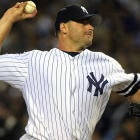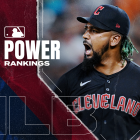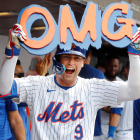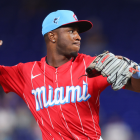Leading up to the announcement of the 2017 Baseball Hall of Fame class on Jan. 18, we're examining each of the 34 candidates on this year's BBWAA ballot. By way of reminder, a candidate must be named on at least 75 percent of submitted BBWAA ballots in order to be elected into the Hall of Fame.
We've already looked at the numerous candidates who are certain to fall off the ballot after only one year (candidates receiving less than five percent drop off the ballot). Now we're looking at those hopefuls who figure to have meaningful support and perhaps even earn induction at some point.
Under the microscope right now is one Roger Clemens.

The case of Clemens isn't overly difficult. It mostly boils down to one's stance on PEDs and Clemens' ties to them.
On the field, there's no question of Clemens' Hall of Fame credentials. A better debate would be whether or not he's the best pitcher of all-time. He won seven Cy Youngs, an MVP and two World Series rings. He's ninth in career wins at 354, 16th in innings pitched, third in strikeouts, 11th with a 143 ERA+ and trails only Cy Young and Walter Johnson in WAR for pitchers. Considering the era in which Clemens pitched, again, he has an argument for the best pitcher ever.
Then again, we have the character clause:
Voting shall be based upon the player's record, playing ability, integrity, sportsmanship, character, and contributions to the team(s) on which the player played.
And Clemens' alleged ties to performance-enhancing drugs.
Jose Canseco said Clemens used steroids, and several of his allegations has since proven to be true. Clemens' name also shows up a whopping 82 times in the Mitchell Report. Most notably, Clemens' former trainer Brian McNamee said that during three different seasons he injected Clemens with steroids. Clemens ended up filing a defamation lawsuit against McNamee and publicly feuded with him through the media and in court.
Eventually, Clemens had to undergo trial for perjury, stemming from his testimony to Congress. He was found not guilty on all six counts.
There's a lot more to the story, but a book could be written about all of this. Basically, there's a ton of smoke here when it comes to Clemens and PEDs, and it's enough for many people to believe he doesn't belong in the Hall of Fame.
So, again, it should be easy here. If you don't care about PEDs or only care about them once the testing system was implemented, Clemens should be in the Hall. If you believe using PEDs of any sort at any time was cheating and should disqualify a player from the Hall, it's overwhelmingly likely that Clemens is a "no" for you.
One thing I do want to tackle is this "he was already a Hall of Famer before he juiced" notion that we often hear about Barry Bonds. We don't seem to hear it as much about Clemens.
The conventional thinking with Clemens is that he was in a steep decline in his last two years with the Red Sox and then hopped onto the juice, propelling him to winning the Cy Young in each of his two seasons in Toronto. He'd later win one with the Yankees at age 38 and the Astros at age 41 (and he should've won it with Houston at age 42, also).
And maybe Clemens did start using 'roids after the 1996 season. It's just that his last two years in Boston weren't exactly as awful as some would have us believe. In 1995-96, he did have a 3.83 ERA combined, but that was worth a 130 ERA+, as run scoring was exploding at the time. Zeroing in on 1996, Clemens led the AL with 257 strikeouts and his 9.5 K/9 was the second-highest mark of his career at the time. He also had six complete games and two shutouts that season.
If that's a steep decline, I think we could find a ton of current big-leaguers who would like to sign up for said decline.
Not only that, but let's say -- for the sake of argument -- that Clemens did start juicing precisely after the '96 season. He was already on a Hall of Fame trajectory.
Through 1996, Clemens was 192-111 with a 3.06 ERA (144 ERA+), 1.16 WHIP and 2,590 strikeouts in 2,776 innings. He had won three Cy Youngs, led the league in ERA four times, WHIP twice, strikeouts three times, complete games twice, shutouts five times, wins twice and innings once. Through age 33, some of his top statistically-similar players were Tom Glavine, Bob Gibson, Tom Seaver and Greg Maddux.
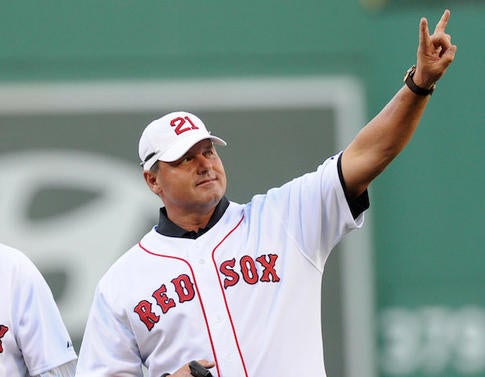
A "normal" pitching career from age 33 probably lasts three or four more seasons with zero Cy Youngs. Still, Clemens would surely have topped 200 wins anyway, and 3,000 strikeouts were a very good bet -- again, we're assuming he started juicing after 1996 and now imagining if he did not.
Let's say Clemens ended up north of 215 wins and 3,000 strikeouts while keeping his ERA+ over 130. All of those things are more than reasonable if he pitched another four seasons at a similar level to 1995-96. Guess how many other pitchers in MLB history had at least 215 wins and 3,000 strikeouts with an ERA+ of over 130? Randy Johnson, Walter Johnson, Greg Maddux and Pedro Martinez. That's it.
Basically, Clemens was already on his way to a Hall of Fame career through 1996. If he did indeed start juicing exactly after 1996, what it did was transform a Hall of Famer into the greatest pitcher of all-time.
This isn't to say that Clemens should be excused for 'roiding up, if he did. It's to say that if we're going to claim Barry Bonds was a Hall of Famer "without the juice," so was Clemens.
As things stand, Clemens is, at bare minimum, a top-five decorated pitcher in history with pretty strong ties to the use of PEDs, but zero failed drug tests or suspensions.
For those intangible things some people like in Hall of Famers, Clemens has them all. Was he feared? Holy hell yes. Did you even have to think about "is he a Hall of Famer?" while he was active -- and before the PED stuff was known? C'mon. Not even close. He was always an easy "yes." Some people like to say stuff like, "Can you tell the story of baseball in his generation without him?" and the answer -- again, a very easy one -- is "no" with Clemens. He's essential to talking about baseball from the mid-'80s to mid-aughts.
Clemens is trending in the right direction here, too. Previously hovering in the 35-38 percent range, he jumped to 45.2 percent of the vote last year. Perhaps the biggest movement in getting Clemens and Bonds into the Hall was the election of Bud Selig by a veteran's committee this past December. By the logic of many voters, if the man presiding over the so-called Steroid Era is a Hall of Famer, why can't the best players from the stained era also join him? I'm not sure I agree with the line of thought there, but Bonds and Clemens have seen noticeable spikes in polling. While Clemens polled around 50 percent last year, he's well over 60 percent this time around (Ryan Thibodaux's tracker is here).
If Clemens does get more than 60 percent of the vote this season and at least three names -- maybe four -- are cleared off the ballot with Clemens having five more chances, I've got some bad news for the people who badly want him kept out: He's getting in at some point. Absent sweeping voting changes or psyche changes from the collective electorate, he'll make it in, probably as part of the 2019 class with at least Bonds.
Other Hall of Fame cases: Posada | Ramirez | Guerrero | Rodriguez | Sosa | Wagner | Walker | Kent | McGriff | Smith | Mussina | Martinez | Bonds









